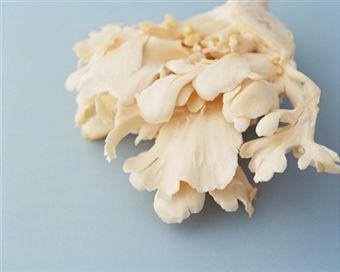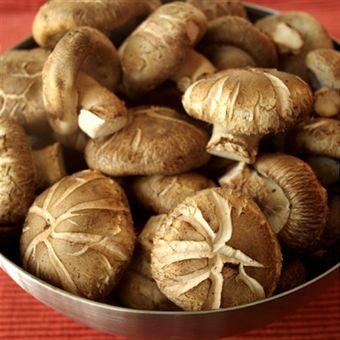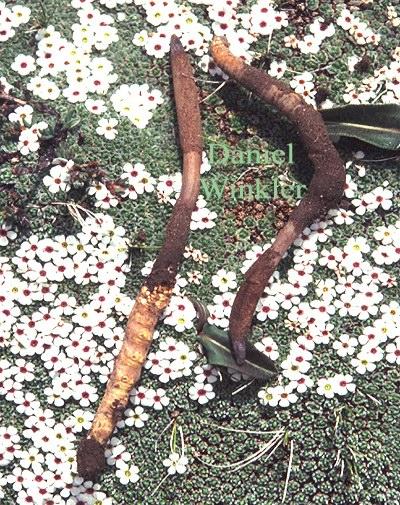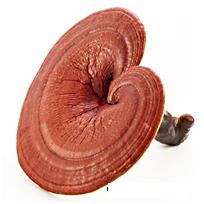Maitake, Shiitake, Cordyceps, Reishi, Coriolus, Chaga, Turkey Tail, Phellinus linteus and Lion's Mane mushrooms have long been used in medicine and today they can help fight many cancers in many ways, but principally through the immune stimulating effect of beta-glucan.
Research is consistent and very clear. Medicinal mushrooms used as organic, concentrated extracts or powders, as Complementary and Integrative Medicine in cancer treatment can:-
* Increase survival times in research trials with breast, lung and prostate cancer patients,
* Shrink cancer tumours by up to 70 per cent
* Stimulate the immune system, for example increasing macrophage activity or stimulating B- and T-lymphocyte production
* Help 'normalise' hormone levels for example, oestrogen
* Reduce blood supply to cancer tumours, and,
* Reduce side-effects of radiotherapy and chemotherapy
If only life were simple. From the research, it all depends which medicinal mushroom or mushroom extract you choose, how concentrated it is, and whether you use complementary doses of vitamin C and other such natural compounds simultaneously. It should also be organic!
Every cancer patient should consider taking an extract of a medicinal mushroom. Like turmeric and vitamin D, these compounds can act in a complementary and integrative way to help you increase your personal odds of beating cancer.
Medicinal mushrooms are nature’s medicine
Mushrooms have long been used in medicine, the earliest records go back over 4,000 years in China. Like the Chinese, other nations from Japan to Korea and Taiwan have built the use of medicinal mushrooms into their treatment of many serious diseases and even cancer.
This historical and medicinal use is not confined to South East Asia. If anything, it is an important part of medicine that people in the West have forgotten. In the market of Le Muy in Provence, France, every Sunday, sits a man selling his Girolles and twenty other varieties, and he will tell you whether they can be used for colds, 'flu, arthritis or diabetes. Traditionally, they helped clean the blood. His father and grandfather taught him everything as they searched through the local woods.
Medicinal mushrooms come in all shapes, sizes and names - Maitake mushrooms, Cordyceps, Shiitake, Chaga, Reishi, Coriolus versicolor, Turkey tail, Lion's Mane and so on. But it's complicated - they all have a number of general benefits but each has a number of specific benefits too. We will try to simplify it below. But my suggestion is that you buy a complex of a number of organically grown, medicinal mushroom,s.
Medicinal mushrooms boost the immune system
Medicinal Mushrooms contain high levels of glycoproteins and polysaccharides (Beta Glucan Polysaccharide being a particularly active health contributor). Research, including 4 Nobel Prizes, shows that glycoproteins can help cellular communications - they help your hormones do their job better, they help receptor sites receive the messages they are supposed to receive, and they help your immune system see the rogue cells and differentiate them from the healthy cells. Below you will see a link to 'Glycoproteins - the coming cancer cure'. Mushrooms are full of glycoproteins. They are a fundamental part of natural medicine.
"If you are already buying Medicinal Mushroom extracts, why not see what OUR NATURAL SELECTION has to offer? CLICK HERE "
Mushrooms can help fight cancer
Not surprisingly, Medicinal Mushrooms can have a massive effect on your immune system, increasing levels of all the different white cells. Indeed, we covered a story in Cancer Watch back in 2003 where Japanese Mushroom growers were shown to have cancer rates far less than the already low rates of the Japanese. It just shows that scrumping has its benefits!
Asian Doctors have used medicinal mushrooms for hundreds of years as blood purifiers to aids for respiratory illness, to enhance the performance of internal organs and for all manner of diseases. In particular, they are used to normalise both hormones, and the blood. The City of Hope Hospital in Los Angeles is studying whether extracts from common button mushrooms can stave off breast cancer recurrence. They possess strong anti-aromatase benefits equal to those of Aromatase Inhibitor drugs! Clinical Trials are taking place.
8 Medicinal Mushrooms you should know about:
 1. Maitake (Grifola frondosa): In Japanese, maitake means dancing, as people who found it in the forests were so happy - it is claimed to promote health and longevity. It is used to treat hypertension and diabetes. It grows at the bottom of trees from mango to oak! Maitake is a powerful adaptagen and restores correct hormone balance. Maitake is also high in antioxidants and contains grifolan, a beta glucan polysaccharide. This activates macrophages which search and engulf foreign invaders in the body. Another 'ingredient', termed d-fraction (a standardised form of protein-bound beta glucans, or proteoglycan), is known to be the most potent compound of any mushroom in stimulating the immune system (e.g. T-cells and NK cells) at the cellular rather than blood stream level and at inhibiting cancer tumours (1).
1. Maitake (Grifola frondosa): In Japanese, maitake means dancing, as people who found it in the forests were so happy - it is claimed to promote health and longevity. It is used to treat hypertension and diabetes. It grows at the bottom of trees from mango to oak! Maitake is a powerful adaptagen and restores correct hormone balance. Maitake is also high in antioxidants and contains grifolan, a beta glucan polysaccharide. This activates macrophages which search and engulf foreign invaders in the body. Another 'ingredient', termed d-fraction (a standardised form of protein-bound beta glucans, or proteoglycan), is known to be the most potent compound of any mushroom in stimulating the immune system (e.g. T-cells and NK cells) at the cellular rather than blood stream level and at inhibiting cancer tumours (1).
D-fraction can be used on its own and seems capable of enhancing the effect of cancer drugs whilst reducing side-effects such as nausea and hair loss. Clinical trial research (Kasylor) has shown reduction of side-effects by up to 95 per cent and improved effectiveness of chemotherapy drugs. Maitake has been found in the Kobe College of Pharmacy to destroy tumours and to be helpful against leukaemia, stomach and bone cancers.
Maitake mushrooms are common in Chinese and Japanese cooking, and both countries use them to treat blood pressure and liver disease. In 2009, researchers at the New York Medical Center, led by Dr. Sensuke Konno, the Head of Urology, have shown that an extract of Maitake mushrooms can shrink tumours of bladder and prostate cancer patients by as much as 75 per cent. In certain cases, the tumours disappeared. Researchers believed this was because the active extract stopped a cancer-driving enzyme. Konno talked about this being a very significant finding, suggesting less drugs might be needed. He also reported patients' quality of life improving.
In a review on the benefits of Maitake D-fraction, Konno also used the extract in conjunction with interferons, which can boost the immune system, and also with vitamin C (2).
 2. Shiitake (Lentinula edodes) grows around decaying wood. Shiitake has been used in medicine for years as a blood balancer and particularly for lowering cholesterol levels and protecting the heart. Both Maitake and Shiitake have been shown to lower LDL cholesterol in research with rats (3) and Shiitake is known for its heart protective effects.
2. Shiitake (Lentinula edodes) grows around decaying wood. Shiitake has been used in medicine for years as a blood balancer and particularly for lowering cholesterol levels and protecting the heart. Both Maitake and Shiitake have been shown to lower LDL cholesterol in research with rats (3) and Shiitake is known for its heart protective effects.
The National Cancer Center in Tokyo isolated Lentinan, a beta glucan and one of the active ingredients, and showed that the extract could reduce tumours in mice by 80 to 100 per cent. Again, this mushroom does not kill cancer directly. In Japan, Lentinan is approved as a biological response modifier in the treatment of certain cancers (e.g. gastric with liver metastasis) with drugs such as oxaliplatin (4).

3. Cordyceps sinenosis and Cordyceps militaris are two of the over 400 species of Cordyceps so far discovered and the most researched. These are anti-bacterial, anti-fungal mushrooms that attack, paralise and then grow on larvae of insects and provide potent antibiotics! The first recorded use of Cordyceps was in the 15th century. It is used in Taiwan and China in the treatment of diabetes and as an antidepressant. Research on aging mice showed extracts improved memory and sexual function. In both mice and fruit flies, Cordyceps extracts increased longevity by decreasing oxidative stress (5).
With cancer, there are numerous different cancer cell laboratory studies; and several with mice and lung cancer, melanoma and lymphoma (6). The researchers from Hong Kong concluded that 'Cordyceps sinenosis had strong anti-tumour activity and was a potential source of natural anti-tumour products' .
 4. Coriolus versicolor, or, Trametes versicolor displays many colours and is commonly known by the name Turkey Tail. It is another mushroom that grows on rotting wood. Memorial Sloan Kettering talk of its early use as a tonic but the main benefits of this group of mushrooms start with its high phenol and flavenoid content - over 35 were detected in one study. Phenols are antioxidants and anti-inflammatory compounds; one, quercetin, promotes interferon-y release inhibiting Cox-2, and the production of inflammatory hormones. Two of the medicinal compounds in these mushrooms are Polysaccharide Peptide, a beta glucan, (PSP), and Polysaccharide Krestin (PSK). These have been shown to activate T-lymphocyte production, macrophage activity and other immune system functions such as NK cells.
4. Coriolus versicolor, or, Trametes versicolor displays many colours and is commonly known by the name Turkey Tail. It is another mushroom that grows on rotting wood. Memorial Sloan Kettering talk of its early use as a tonic but the main benefits of this group of mushrooms start with its high phenol and flavenoid content - over 35 were detected in one study. Phenols are antioxidants and anti-inflammatory compounds; one, quercetin, promotes interferon-y release inhibiting Cox-2, and the production of inflammatory hormones. Two of the medicinal compounds in these mushrooms are Polysaccharide Peptide, a beta glucan, (PSP), and Polysaccharide Krestin (PSK). These have been shown to activate T-lymphocyte production, macrophage activity and other immune system functions such as NK cells.
For example, PSK increases dendritic cell activity and promotes macrophage activity. One study (7) showed that it enhanced HER-2 breast cancer-targeted monoclonal antibody treatment (Herceptin, Perjeta) by stimulating NK cells. PSK has been developed for cancer treatment in Japan and being effective with gastric and colorectal cancers, through its immune boosting actions.
For example, PSP is used in China and Japan alongside chemo- and radiotherapy. One study (8) said this about PSP: 'PSP activates immune cells, increases the expressions of cytokines and chemokines such as tumour necrosis alpha, interleukins, histamine and protaglandin E, enhances dendritic cell and T-cell infiltration into tumours and ameliorates the adverse events associated with chemotherapy'.
One meta-analysis (9) showed that people taking Turkey tail alongside standard treatments such as chemotherapy had a 9% improvement in 5-year survival.
Active ingredients PSP and PSK have been shown in research to increase breast cancer survival. They reduce treatment side-effects and boost the immune system. There is research with PSP and PSK on this website showing increases in survival for lung, oesophageal, cervical, stomach and ovarian cancer. PSK and PSP are available as supplements.
 5. Reishi (Ganoderma lucidium) contains beta glucan polysaccharides that are effective in suppressing cancer cells.
5. Reishi (Ganoderma lucidium) contains beta glucan polysaccharides that are effective in suppressing cancer cells.
Research by Dr Fukumi Morishiga at the Linus Pauling Institute of Science and Medicine took a hot water extract of Reishi (which concentrates the active ingredients much more than you will find in retail products) and showed that when used in conjunction with vitamin C (which humans, unlike animals, cannot make), macrophage activity was greatly stimulated. In his paper he showed that all manner of cancers from brain tumours to breast cancer regressed over time. Some disappeared.
A meta-analysis of randomised, controlled Clinical trials showed (10) that while the mushroom extract did little on its own, people who took it alongside chemo- or radiotherapy were 1.27 times more likely to have a positive response. Patients in the mushroom group had more NK cells and a better quality of life during treatment.
6. Phellinus linteus is a mushroom that grows on mulberry trees. In 1993 Korean scientists successfully extracted an anti-tumour medicine from Phellinus linteus, following the 1968 research study by Dr Ikegawa (Anti-tumour activity of some basidiomycetes, especially Phellinus linteus). This prompted many further studies, but also the term Magic Mushroom as superstitious folklore in South East Asia has been improperly translated into the English language. Correctly, it is described as a mushroom with very special properties. Phellinus has been used in Chinese Medicine for thousands of years for everything from rheumatism to arthritis and gout.
The faculty of science at Mahasarakham University, Thailand now has a museum dedicated to this mushroom, with case history after case history on successful cancer treatments from colon to lung. Biochemistry Professor Tae Woong Kim of the Korean National University says that the mushroom extracts kill cancer cells with no known side-effects or toxicity.
Several other studies (e.g. from Leo JLD Van Griensven and Huub Savelkoul) have shown that beta glucans from these mushrooms can alter cytokine and T- and B-cell activity, prompting the view that the mushrooms would not just be applicable to fighting solid tumour cancers, but also in fighting blood cancers where the white cells themselves were in trouble (like leukaemia).
Now researchers at the Boston University School of Medicine have studied Phellinus linteus. In one test they found that neither the mushroom extract nor Doxorubicin or Adriamycin, used with breast, bladder, lymphoma, leukemia and prostate cancers were effective in small doses, but the Doxorubicin became effective at higher levels. When the mushroom extract was added, the results were much better still, with many more cancer cells killed (British Journal of Cancer August 2006). Previous studies in 2005 (Drug Discovery Today) showed that Reishi restricted blood vessels in prostate cancer tumours and stopped cancer cell proliferation.
7. Hericium erinaceus, or, Lion's Mane - traditional use was for the brain. The mushrooms contain hericenones and erinacines which stimulate the growth of brain cells - possibly relieving dementia, depression, anxiety. One study, specifically on Alzheimer's showed strong neuroprotective properties (11). It also seems to prevent and reduce symptoms of ulcers and ulcerative colitis - from H pylori to alcohol induced. It also seems capable of reducing blood triglyceride levels.
Like all of these mushrooms there are immune boosting properties. One study in mice (12) showed it limited colorectal cancer spread to the lungs; and another (13) showed that it seemed to improve the effectiveness of 5-FU, Cisplatin and Doxorubicin with the same cancer.
Medicinal Mushrooms - anti-oestrogen effects
8. Chaga: These mushrooms (Inonotus obliquus) grow particularly in cold climates on the bark of decaying trees. The fungus is a traditional remedy for inflammation, a variety of ailments, boosting the immunity (it is an antioxidant) and even weight loss in countries such as Russia and those of South East Asia.
This rather ugly mushroom resembles charcoal on the outside, but has a mushy orange/yellow centre. The word 'Chaga' is derived from the Russian word for mushroom. It has a particularly high ORAC value and is a good antioxidant and immune booster. It is difficult to cultivate and so most Chaga mushrooms are wild and organic. Chaga is a good source of minerals and B vitamins, vitamin K and even vitamin D.
Research from Showa University in Japan in 2005 showed that extracts reduced lung cancer tumours in mice by 60 per cent, and numbers by 25 per cent by cutting blood supplies. Research has also shown that Chaga mushroom extract (CME) can make drugs such as Cyclophosphamide more effective and be a useful complementary therapy with both drugs and radiotherapy. A 2015 study showed that CME could inhibit colorectal cancer and a 2021 study showed CME could inhibit breast cancer by promoting the AMPK pathway. Other studies have covered melanoma, and liver cancer. The active ingredients include Ergosterol, Inotodiol and Trametenolic acid. Chaga mushrooms have many health benefits (14).
And then there are Button mushrooms - are they really any help?
 Button Mushrooms (Agaricus bisporous): Research from Perth University in Western Australia showed that women who ate 10 gms of button mushrooms a day, developed one third of the breast cancers of non-eaters!
Button Mushrooms (Agaricus bisporous): Research from Perth University in Western Australia showed that women who ate 10 gms of button mushrooms a day, developed one third of the breast cancers of non-eaters!
The reason given was their content of conjugated linoleic acid, which acts as an aromatase inhibitor and restricts the production, and action, of oestrogen. Button mushrooms seem to restrict Er+ve breast cancer. This is exactly what the City of Hope Hospital in the USA is also finding.
The same study noted that if these women also drank green tea, their breast cancer rates fell to just 1 in 10 of the norm! So button mushrooms and green tea it is!
A study by UCLA in 2009 showed that breast cancer patients who ate medicinal mushrooms two times per day, prevented their cancers returning. Again, this was concluded to be due to the mushrooms' anti-oestrogen activity.
So eat your button mushrooms - a little olive oil, chopped garlic and parsley. Very tasty and extremely healthy!!
Summary - Medicinal Mushrooms and cancer
Clearly, if you have cancer, I think you really should use the above guide and think very seriously about taking any relevant mushroom extract for you and your cancer. 4000 years of medicinal history cannot be ignored.
Go to: Glycoproteins - the coming cancer treatment
*****
References
1. Journal of Orthomolecular Medicine; 1997, Vol 12 (1). Maitake D-fraction; Doctor Hiroaki Nanba
2. In J Gen Med, 2009 2, 91-108; Sensuka Konno
3. Fukushima et al: Exp Biol Med 2001; Cholesterol-lowering effects of Shiitake, Maitake - LDL in rats.
4. MDPI vol 4 Iss 2; Kenji Ina et al, Nagoya, Memorial Hospital; Chemo-immunotherapy using Lentinal
5. Int J Mol Med; 2015; Yingxin Zou et al. Cordyceps sinensis oral liquid prolongs life span by reducing Oxidative Stress
6. Jian Yong Wu et al; Phytomedicine 2007, Jan 14(1); 43-49; Inhibitory effects
7. Clin Can Res, 2011, Nov 1,17(21) Hailing Lu et al. TLR2 agonist PSK activates human NK cells and enhances the anti-tumour effect of HER-2 targeted monoclonal antibody therapy
8. Discover Med; 2017 Apr 23(127); Yajing Chang et al.
9. Pat Inflamm Allergy drug Discov 2012 Jan; 6(1) 78-87; Wong L Y Eliza et al;
10. Ganoderma lucidum (Reishi Mushroom) for cancer treatment Cochrane database Sys Review 2016; XingZhong Jin et al; University of Tasmania
11. The Neuroprotective properties of Hericium erinaceus; Int J Mol science; 2016, Nov 17. Junrong Zhang et al.
12. J Agric Food Chem 2013; May 22; Sung Phil Kim
13. J Ethnopharmacol 2014 Apr 28 (153); Guang Li et al
14. Chaga mushrooms, health benefits, side effects
"If you are already thinking of supplementing with mushroom extracts, you might like to look at the Natural Selection shop. Do it by CLICKING HERE."
*****
Please be clear: At CANCERactive we do not consider any of the above compounds to be a cure for cancer, despite what the research says or experts doing the research may claim. The above, is an article on the compounds from published research and expert opinion in the public domain. At CANCERactive we do not believe that any single compound (drug, vitamin, whatever) is a cure for cancer. We believe that people can significantly increase their personal odds of survival by building an Integrated Programme of treatments. Equally, cancer prevention is best practiced through a width of measures.